Key takeaways:
- The importance of informed consent is underscored as a vital element for respecting participant autonomy and fostering a genuine research partnership.
- Institutional Review Boards (IRBs) enhance ethical research by assessing studies and providing diverse perspectives that challenge biases and improve methodologies.
- Developing a culture of ethics within research institutions is crucial, encouraged through open discussions, mentorship, and ongoing reflection on ethical practices.
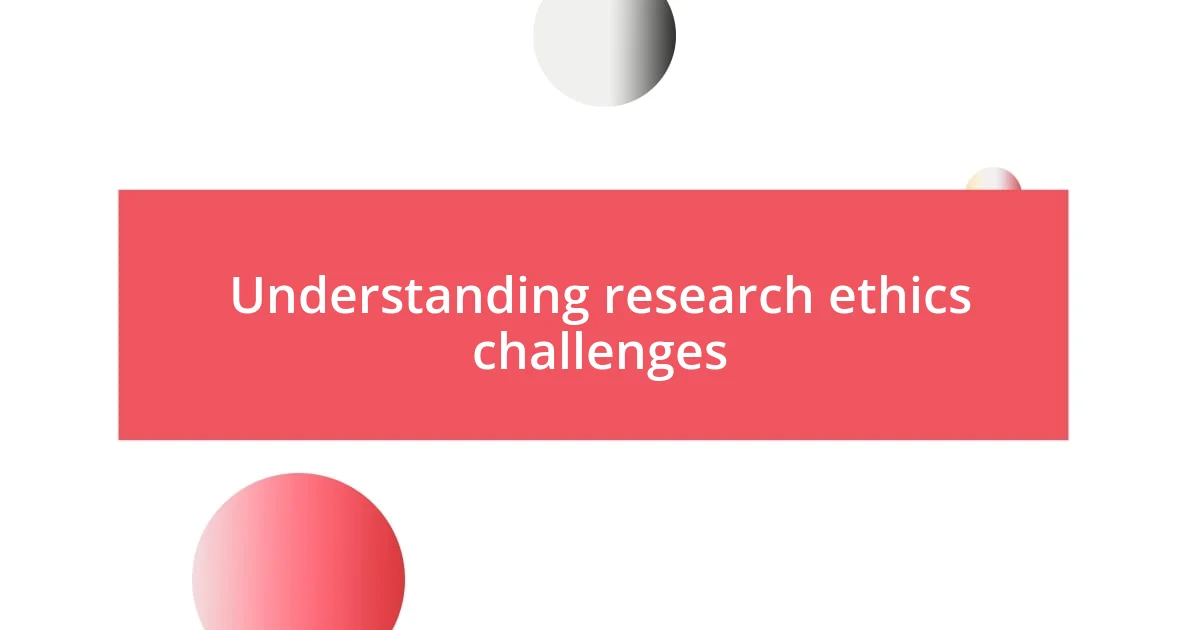
Understanding research ethics challenges
Research ethics challenges can be quite complex and multifaceted. I recall a project where I had to navigate the thin line between data privacy and the necessity for transparency. It made me wonder—how much should we sacrifice in the name of progress?
One significant challenge I grapple with is ensuring informed consent. It’s crucial for participants to truly understand what they’re agreeing to. I often think about how I would feel if I were in their position. Would I fully grasp the implications of participating? This reflection drives me to communicate clearly and empathetically with research subjects.
Then there’s the dilemma of bias in research. I remember a time when I realized that my own perspectives were influencing my interpretations. How do we maintain objectivity while still bringing our experiences into the study? Acknowledging our biases is just the first step; it’s the commitment to correcting them that defines ethical research.
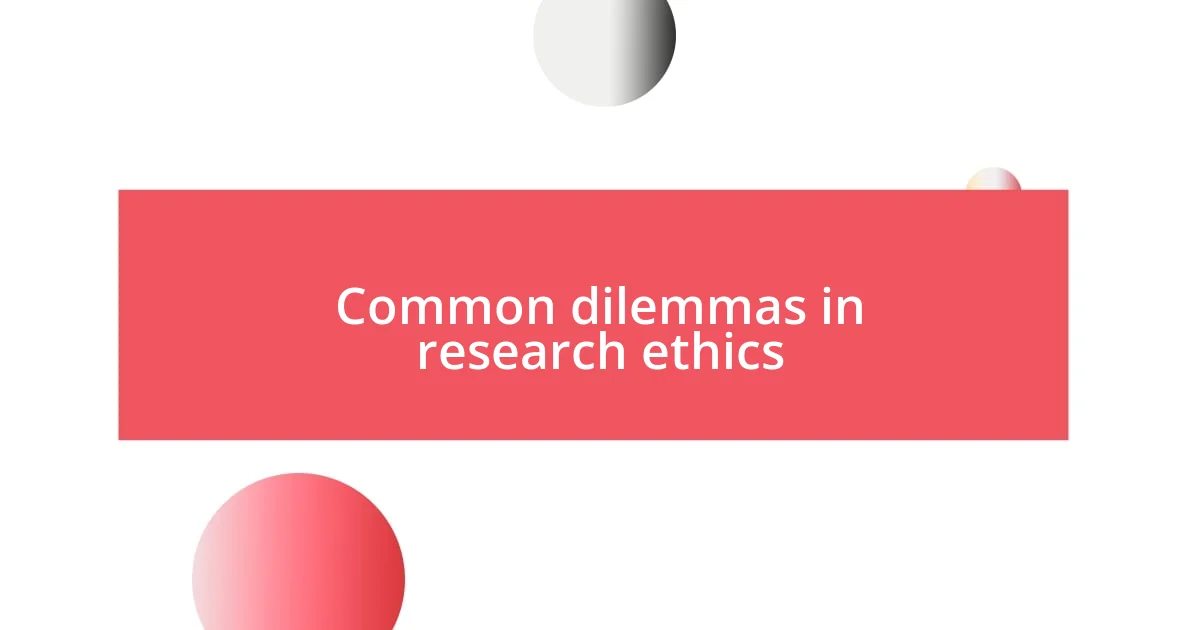
Common dilemmas in research ethics
Navigating common dilemmas in research ethics can feel like walking a tightrope. One area that often gives me pause is the tension between scientific advancement and participant welfare. I recall a project where we had the potential to ignite a breakthrough in health interventions. Yet, the prevailing question haunted me: At what cost to our subjects? Balancing the benefits of our research against the potential risks is a constant ethical struggle.
A few notable dilemmas regularly arise in the research landscape, including:
- Informed Consent: Ensuring participants fully grasp what they are agreeing to, so they feel respected and empowered.
- Data Privacy: Protecting sensitive information while encouraging transparency in research findings.
- Conflict of Interest: Managing personal or financial interests that could skew the research outcomes.
- Cultural Sensitivity: Respecting the beliefs and practices of diverse groups while conducting studies.
- Publication Pressure: The urge to publish significant findings can sometimes lead to ethical compromises in data reporting.
Each issue requires careful consideration, reminding me that ethical research isn’t merely about following guidelines—it’s about genuinely valuing the well-being of all involved.
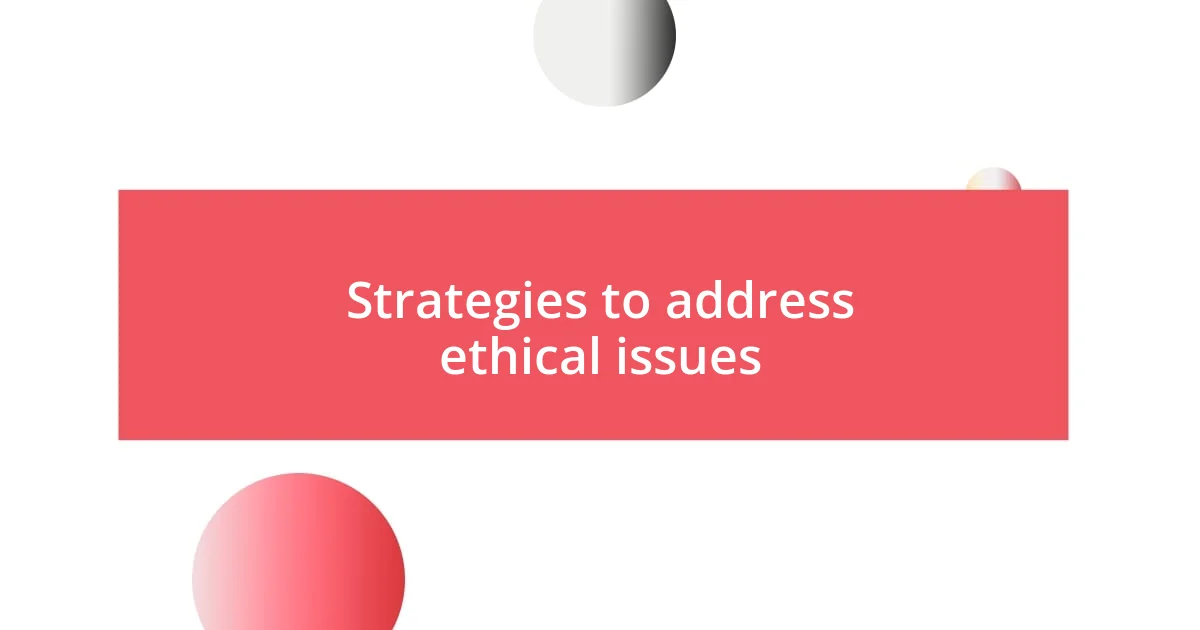
Strategies to address ethical issues
Addressing ethical issues in research requires a proactive and nuanced approach. Developing comprehensive training programs for researchers is essential. I once attended a workshop that transformed my understanding of ethics in research; it highlighted real-world scenarios that could easily be overlooked. This kind of training equips researchers with the tools to anticipate dilemmas before they arise, fostering a culture of ethical awareness and responsibility.
Another effective strategy involves establishing an ethics review board that includes diverse perspectives. In my experience, a multidisciplinary team can bring various viewpoints that challenge assumptions and lead to more robust ethical considerations. For instance, during one of our project reviews, an ethicist pointed out implications I hadn’t even considered. This moment reinforced the importance of collaborative dialogue in ensuring that all ethical aspects are thoughtfully examined.
Lastly, engaging with participants through regular feedback helps create a more ethical research environment. I remember conducting a follow-up survey where participants expressed their concerns about the research process. Listening to their feedback not only improved my subsequent projects but also strengthened their trust in the research. This two-way communication demonstrates a commitment to ethical practices and reinforces the value of participant welfare at every phase of research.
| Strategy | Description |
|---|---|
| Training Programs | Workshops and seminars focus on real-world scenarios to prepare researchers for ethical dilemmas. |
| Ethics Review Board | A diverse team ensures multiple perspectives are considered in ethical evaluations. |
| Participant Engagement | Regular feedback from participants enhances trust and improves ethical practices. |
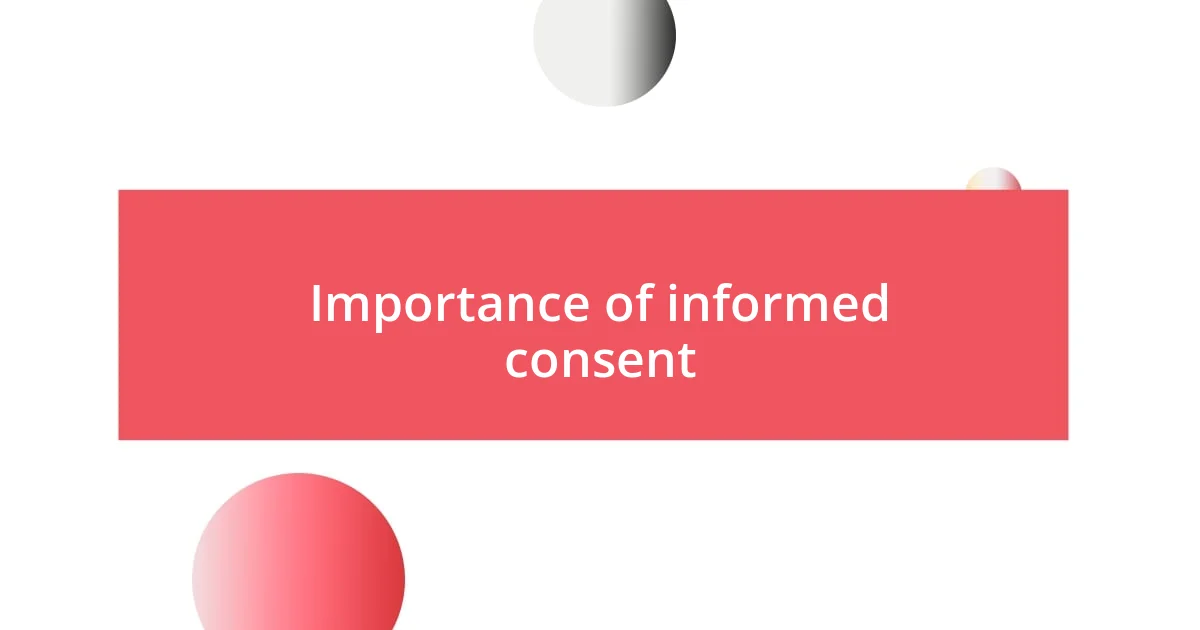
Importance of informed consent
Informed consent is a cornerstone of ethical research, serving as a vital touchpoint between researchers and participants. I often ponder how crucial it is for participants to truly understand what they’re signing up for. I recall a study I was involved in where participants seemed unsure about their rights. This experience underscored for me that clear, accessible communication is the key to ensuring their autonomy is respected.
Delving deeper, I’ve noticed that informed consent goes beyond just a signature; it’s about fostering a genuine partnership. Participants should feel empowered to ask questions and voice concerns. During one project, I invited participants to a pre-study meeting, and it was enlightening to see how much more confident they felt after discussing the study’s goals and risks. Wouldn’t we all want to feel informed and valued when contributing to research?
Moreover, informed consent can act as a safeguard for researchers too. It opens the door for transparency, enhancing the project’s credibility. I’ve experienced moments where participants shared valuable insights that helped refine the study design, simply because they felt safe and informed. This mutual respect not only benefits the research outcomes but also cultivates a sense of community around the study. How do you think informed consent can evolve to meet the challenges of modern research?
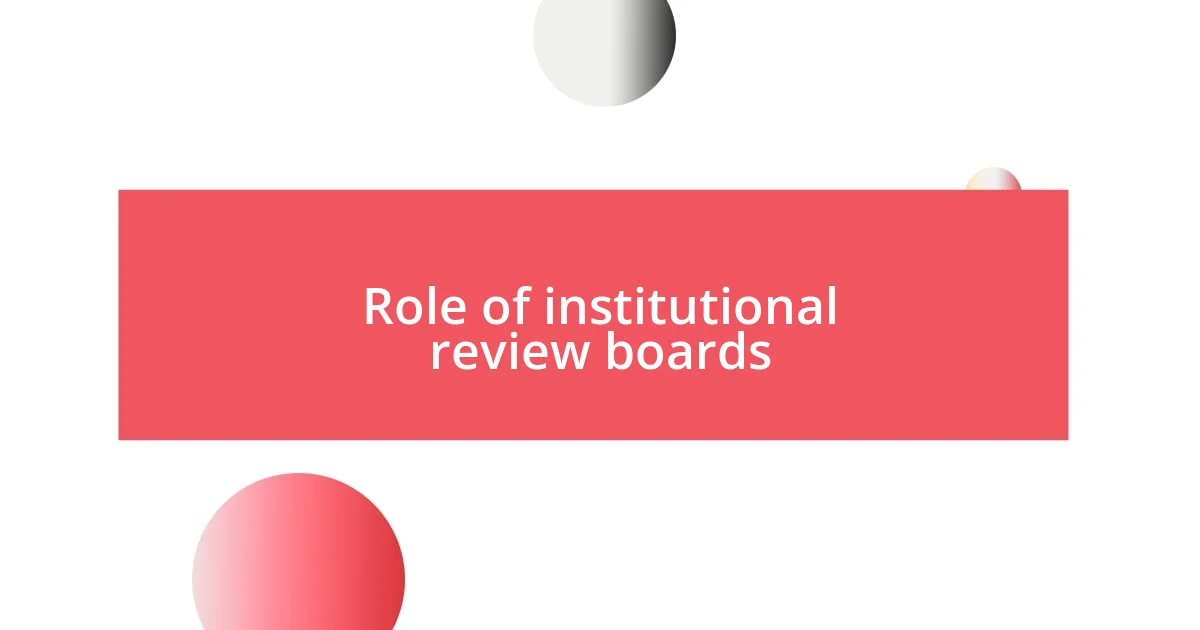
Role of institutional review boards
Institutional Review Boards (IRBs) play a pivotal role in safeguarding ethical standards in research. They assess proposed studies to ensure that participants’ rights and welfare are prioritized. I remember presenting a project proposal to an IRB and their insightful questioning made me reconsider certain aspects I had taken for granted. Their scrutiny often leads to improvements that strengthen the integrity of the research itself.
The composition of an IRB is crucial; a diverse board brings a wider array of perspectives, which, I’ve observed, can challenge biases and enhance the ethical evaluation process. In one experience, a member with a background in law identified regulatory nuances that profoundly impacted our approach. It’s moments like these that remind me of the importance of having varied voices in ethical discussions.
Furthermore, IRBs don’t merely act as gatekeepers; they serve as educators for researchers. Their feedback often provides invaluable lessons about conducting ethical research. I recall a debriefing session following an IRB review where we discussed the ethical implications of our methodologies, prompting deeper reflection on how we engage with participants. Shouldn’t every research endeavor aim to meet not just the requirements but the spirit of ethical inquiry?
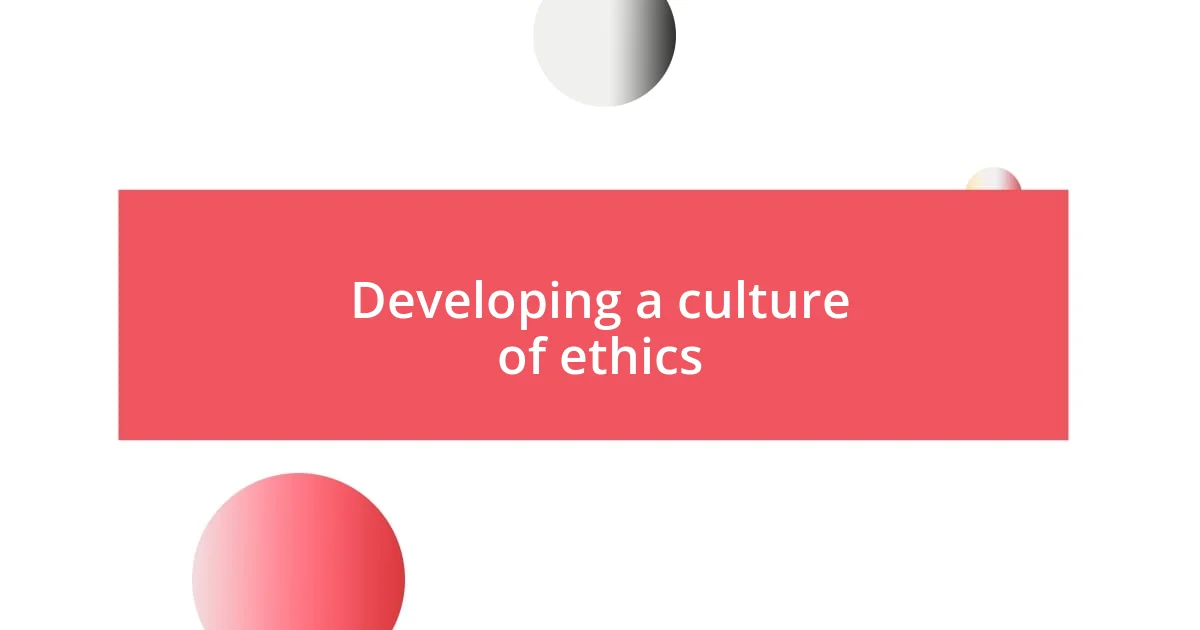
Developing a culture of ethics
Creating a culture of ethics within research institutions is essential for ensuring integrity and trust. I remember the palpable sense of collaboration when my team prioritized ethical discussions during our regular meetings. This atmosphere encouraged everyone to speak up, fostering a sense of collective responsibility. How often do we reflect on the power of shared values in shaping our research environment?
It’s interesting to note that informal conversations can greatly influence a culture of ethics. In one instance, a casual coffee chat with a colleague led to a deep dive into the ethical implications of our data collection methods. This dialogue not only clarified our ethical stance but also reinforced the importance of ongoing discussions about integrity. Doesn’t it seem that the more we talk about ethics, the more it becomes embedded in our daily practices?
Moreover, mentorship plays a significant role in cultivating this ethical culture. I’ve had mentors who not only emphasized ethical practices but also modeled them in their own work. Their actions spoke volumes – it taught me that ethics isn’t just a checkbox but a fundamental aspect of being a responsible researcher. Isn’t it crucial for us to lead by example so that the next generation of researchers continues this legacy?















